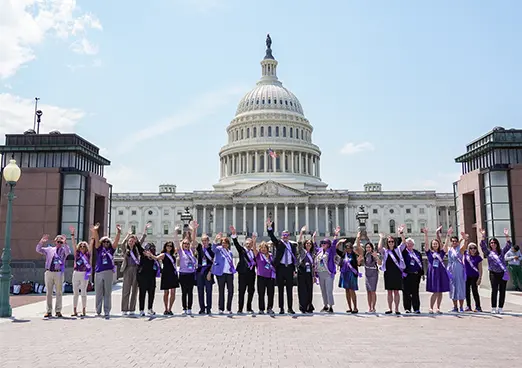Energized advocates commit to doing more in the fight against Alzheimer’s
More than 1,100 passionate advocates from all 50 states put on their purple and gathered in Washington, D.C., to kick off the 2025 Alzheimer’s Impact Movement (AIM) Advocacy Forum. Whether it was their first or 10th time attending, advocates with their own unique yet somehow shared experiences felt connected and empowered by the Forum’s energy.
Forum Co-Chairs Leah Farley and Hector Montesino welcomed new and returning advocates and reflected on how attendees have been impacted by dementia in different ways. Some have lost loved ones to the disease, while others are caregivers for someone living with dementia; others, like Farley, are living with Alzheimer’s.
Farley explained how she met her good friend Kerry Dennis, who was experiencing a similar Alzheimer’s journey, by chance and how they both became involved with the Alzheimer’s Association.
“Since meeting Kerry and my involvement with the Alzheimer’s Association, I’ve strengthened my voice through advocacy,” Farley said.
Highlighting his own commitment to advocacy, Montesino shared his personal connection to the disease with his abuela, Ana Maria Espinal, as well as his decision to pursue a career in the home- and community-based care sector. Montesino and Farley joined with their fellow advocates to reaffirm their relentless commitment to the fight against Alzheimer’s and other dementia.
“Today, there are more than 1,100 of us in this beautiful room, and there are millions and millions more at home,” Montesino said. “It’s our community, it’s our friends, it’s our family. And we’re just going to continue to fight.”
Joanne Pike, DrPH, Alzheimer’s Association president and CEO and AIM CEO, amplified the excitement by recognizing and thanking advocates for all of the amazing progress over the last year. “Last fall, because of you, we celebrated the renewal of three of the most important bipartisan laws on Alzheimer’s and dementia — NAPA, the Alzheimer’s Accountability and Investment Act, and BOLD,” Pike said.
During the last Congress, 1,870 health-related bills were introduced. Only 16 were signed into law. Of those 16, three were the Association’s priority bills.
Pike addressed proposed cuts at the Department of Health and Human Services (HHS), the Centers for Disease Control & Prevention (CDC) and the National Institutes of Health (NIH), and how the Association and AIM are taking action. By addressing misinformation, collaborating with the research community and working to ensure that policymakers at the federal and state levels uphold our nation’s strong commitment to the fight against Alzheimer’s and other dementia, the Association, AIM and advocates are making a difference.
“The Alzheimer’s Association and AIM will do more, not less,” Pike said.
Read more about successes on the state level here.


